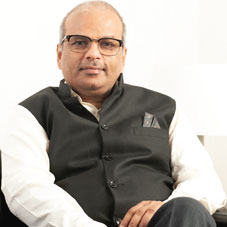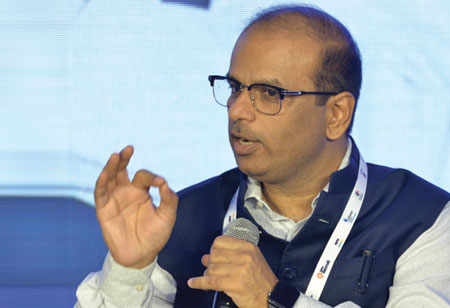
Ved Mani Tiwari
CEO
In an exclusive interview with CEO Insights, Ved Mani Tiwari discusses his strategies for leveraging technologies to fulfill the growing need for skilled manpower in India and contribute towards building a better future for the country.
Could you tell us about the unique experiences The Wharton School University of Pennsylvania offers and what did you learn from the campus beyond academics?
My experience at the Wharton School, University of Pennsylvania, was a transformative phase of my professional development. Pursuing an advanced management program at one of the world's leading business schools provided me with a unique and enriching learning experience. The curriculum at Wharton was rigorous and comprehensive, covering various aspects of management, strategy, and leadership. The case based approach to learning was particularly impactful, as it allowed me to delve deep into real-world business challenges and analyze them from multiple perspectives. This methodology not only sharpened my analytical skills but also nurtured my ability to think critically and make informed decisions. Interacting with accomplished professionals from diverse backgrounds was another invaluable aspect of my time at Wharton. Engaging in discussions, debates, and collaborative projects with my peers provided me with new insights and alternative viewpoints. These interactions broadened my horizons and expanded my understanding of different industries and markets.
One of the most significant learnings from my time at Wharton was the importance of strategic thinking and long term planning. The faculty members and guest lecturers emphasized the need to consider both short term goals and
long term vision when formulating strategies. This insight proved instrumental in my career, especially when dealing with complex projects and navigating through uncertain environments. Furthermore, the exposure to cutting-edge research and the latest trends in business and management provided me with a forward thinking mindset. Wharton's emphasis on innovation and adaptability taught me the importance of staying ahead of the curve and continuously evolving to meet the challenges of a dynamic business landscape. The networking opportunities at Wharton were also invaluable. Interacting with accomplished alumni, industry leaders, and renowned faculty members allowed me to build a robust professional network. These connections not only provided mentorship and guidance but also opened doors to new opportunities and collaborations throughout my career.
The learnings from Wharton proved beneficial in my career in several ways. Firstly, the strategic thinking and long-term planning skills I acquired enabled me to envision and execute large-scale transportation projects. Understanding market dynamics, analyzing risks, and developing comprehensive strategies became second nature to me, allowing me to navigate complex challenges with confidence. Secondly, the emphasis on innovation and staying abreast of emerging technologies equipped me with the knowledge and mindset to leverage advancements in the transportation sector.
From implementing smart transportation systems to exploring sustainable solutions, I continuously sought opportunities to integrate innovative approaches into my work. Additionally, the interdisciplinary nature of the Wharton program fostered a holistic perspective on business and management. This broad understanding enabled me to collaborate effectively with professionals from diverse backgrounds, ensuring a well-rounded and inclusive approach to problem-solving. Overall, my experience at the Wharton School was instrumental in shaping my career trajectory. The learnings, insights, and skills acquired during my time there continue to guide me in driving transformative change and delivering impactful results in the transportation sector
How would you define NSDC as an organization and its current position in the market?
National Skill Development Corporation (NSDC) is an organization that was conceived about one and a half decades ago with the aim of being a market maker for short-term skills. Initially, there was a lack of training ecosystems for the services sector and emerging sectors post liberalization. NSDC filled this gap by focusing on skill development in various sectors beyond the traditional industrial and vocational fields. Over the past few years, especially with the impact of the pandemic and technological shifts worldwide, the importance of skills has gained significant recognition. NSDC has positioned itself strongly in the education ecosystem, transitioning from vocational training to a career-defining space. Today, it is considered a central architect of the skill ecosystem in India, catering to both white-collar and blue-collar job sectors. Businesses and educational institutions seek to connect with NSDC to leverage its expertise in skill development.
What are a few traits that best associate with your style of leadership?
Having a huge ambitious vision and
The learnings from Wharton proved beneficial in my career in several ways. Firstly, the strategic thinking and long-term planning skills I acquired enabled me to envision and execute large-scale transportation projects. Understanding market dynamics, analyzing risks, and developing comprehensive strategies became second nature to me, allowing me to navigate complex challenges with confidence. Secondly, the emphasis on innovation and staying abreast of emerging technologies equipped me with the knowledge and mindset to leverage advancements in the transportation sector.
From implementing smart transportation systems to exploring sustainable solutions, I continuously sought opportunities to integrate innovative approaches into my work. Additionally, the interdisciplinary nature of the Wharton program fostered a holistic perspective on business and management. This broad understanding enabled me to collaborate effectively with professionals from diverse backgrounds, ensuring a well-rounded and inclusive approach to problem-solving. Overall, my experience at the Wharton School was instrumental in shaping my career trajectory. The learnings, insights, and skills acquired during my time there continue to guide me in driving transformative change and delivering impactful results in the transportation sector
How would you define NSDC as an organization and its current position in the market?
National Skill Development Corporation (NSDC) is an organization that was conceived about one and a half decades ago with the aim of being a market maker for short-term skills. Initially, there was a lack of training ecosystems for the services sector and emerging sectors post liberalization. NSDC filled this gap by focusing on skill development in various sectors beyond the traditional industrial and vocational fields. Over the past few years, especially with the impact of the pandemic and technological shifts worldwide, the importance of skills has gained significant recognition. NSDC has positioned itself strongly in the education ecosystem, transitioning from vocational training to a career-defining space. Today, it is considered a central architect of the skill ecosystem in India, catering to both white-collar and blue-collar job sectors. Businesses and educational institutions seek to connect with NSDC to leverage its expertise in skill development.
What are a few traits that best associate with your style of leadership?
Having a huge ambitious vision and
an exponential mindset to resolve large problems are my approach toward leadership. Also, I am a very strong operations person and when it comes to executing any plan, I go to the last details of the execution plan. I believe in the power of exponential organizations and understand that addressing significant problems requires an exponential mindset. I also have strong operational capabilities and can zoom in and out when envisioning strategies. While executing plans, I delve into the minute details. So I believe in micromanagement at times. I am a risk-taker, as I believe leaders should venture into unknown territories. Moreover, I have a firm belief in the potential of individuals to achieve amazing things. Nurturing this belief and helping my teams realize their capabilities is an essential aspect of my leadership approach. Overall, I strive to inspire and empower others to achieve their mission and vision.
What is the future destination you are heading towards?
Going forward, I envision a world that is entering an exciting phase with advancements in energy, data sciences, artificial intelligence, and technologies like ChatGPT. This development demands the cultivation of future-driven skill sets to navigate the changing landscape effectively. The integration of machines and human beings will play a crucial role, where cognitive robots, automation, and collaborative robotics will coexist. While this paradigm shift will occur rapidly, social and educational systems tend to respond slowly. To address this, I aim to be a leader of change rather than a mere follower. My primary goal is to bring next-generation skills to the youth of my country, as I believe India has the potential to lead the world in this evolving era. I strive to ensure that young Indians possess the necessary skills to seize emerging opportunities and contribute to the nation's progress for at least the next two and a half decades.
In the light of your strong experience within the industry, what advice would you give to the budding industry leaders?
In today’s time, one should embrace a continuous learning mindset. In the face of disruptive changes in social, economic, and technological contexts, we must be willing to unlearn and reskill our selves accordingly. The ability to adapt to a volatile and dynamic world will be crucial. Leaders who adopt mindsets that foster leadership in such environments will be better equipped to guide their teams towards success. Therefore, my expectation from aspiring leaders is to be prepared for a dynamic world, constantly evolving their skills and embracing new perspectives. By doing so, they can set benchmarks in the industry and inspire their teams to perform at their best.

Ved Mani Tiwari, CEO, National Skill Development Corporation
A dynamic business leader with exposure to both public service and private service industries, Ved Mani Tiwari possesses global experience in several sectors such as transportation, urban infrastructure, renewable energy, and cleantech. He is an avid reader and drew inspiration from the stories of successes in the face of challenges. In his career choices, he makes sure that it eventually improves the well-being of society
What is the future destination you are heading towards?
Going forward, I envision a world that is entering an exciting phase with advancements in energy, data sciences, artificial intelligence, and technologies like ChatGPT. This development demands the cultivation of future-driven skill sets to navigate the changing landscape effectively. The integration of machines and human beings will play a crucial role, where cognitive robots, automation, and collaborative robotics will coexist. While this paradigm shift will occur rapidly, social and educational systems tend to respond slowly. To address this, I aim to be a leader of change rather than a mere follower. My primary goal is to bring next-generation skills to the youth of my country, as I believe India has the potential to lead the world in this evolving era. I strive to ensure that young Indians possess the necessary skills to seize emerging opportunities and contribute to the nation's progress for at least the next two and a half decades.
In the light of your strong experience within the industry, what advice would you give to the budding industry leaders?
In today’s time, one should embrace a continuous learning mindset. In the face of disruptive changes in social, economic, and technological contexts, we must be willing to unlearn and reskill our selves accordingly. The ability to adapt to a volatile and dynamic world will be crucial. Leaders who adopt mindsets that foster leadership in such environments will be better equipped to guide their teams towards success. Therefore, my expectation from aspiring leaders is to be prepared for a dynamic world, constantly evolving their skills and embracing new perspectives. By doing so, they can set benchmarks in the industry and inspire their teams to perform at their best.

Ved Mani Tiwari, CEO, National Skill Development Corporation
A dynamic business leader with exposure to both public service and private service industries, Ved Mani Tiwari possesses global experience in several sectors such as transportation, urban infrastructure, renewable energy, and cleantech. He is an avid reader and drew inspiration from the stories of successes in the face of challenges. In his career choices, he makes sure that it eventually improves the well-being of society

